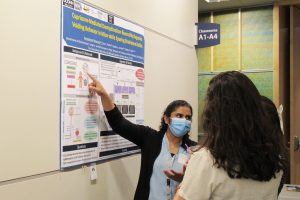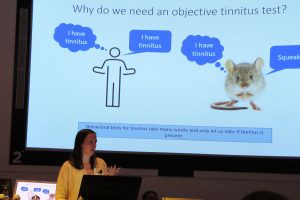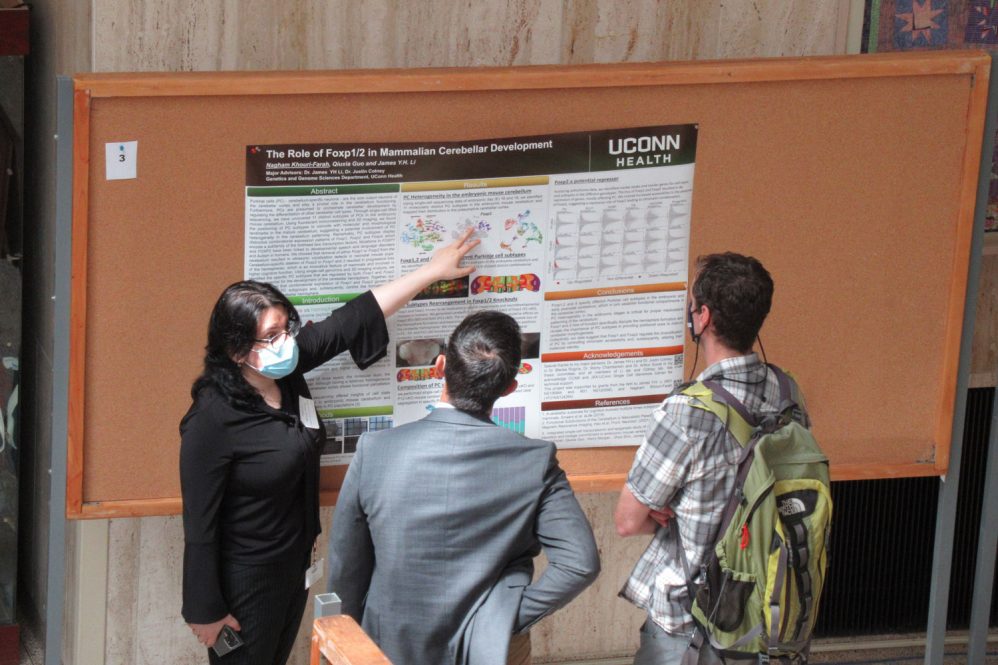It was midmorning in mid-July when students in UConn Health’s Biomedical Science programs began to gather at the academic rotunda hallway, research in hand, to collect their name badges and pushpins.
Directing her fellow students to their poster locations was outgoing Graduate Student Organization (GSO) Vice President Dea Gorka. Due to COVID restrictions, Gorka was the only student there to have presented a poster herself in 2019, the last time the Biomedical Science Graduate Student Research Day (GSRD) was able to include this live portion of the event.
Participants at this annual celebration of the research accomplishments of the biomedical science students in the UConn Health Graduate School programs on the Farmington campus were thrilled to have the opportunity to gather once again to share their research with their fellow classmates and the University community at large.
“As the pandemic drags on, many of our students have had very few opportunities to give a poster presentation. This particular medium of interaction is integral for training scientists because it allows them to develop informal communication skills that all scientists need to have,” says second-place poster presenter award winner Blake Torrance.

“These types of events are crucial training opportunities to be able to practice science communication and presentations with our peers and other academics of various backgrounds,” says incoming GSO President Rachel Gilmore. “I am passionate about science communication; I truly believe that if we cannot explain and disseminate our science then it does the world no good. As a rising fourth-year student, this was only my fourth in-person opportunity to be able to share my work, and all have occurred within the last four months.”
The impact of the pandemic on education and research cannot be underestimated, and while virtual seminars and classes have kept things going, it is the sense of community that has taken the most significant hit.
“During the course of the pandemic a lot of contact with other peers or students has been limited to my area of concentration (AoC). It is through events such as this that I am able to understand and appreciate how big and supportive the UConn Health biomedical science community truly is,” commented combined MD/Ph.D. student and Raisz Award winner Patrick McMullan.
Gilmore agrees: “It is so important to have events like Biomedical Science GSRD for a sense of graduate school community. This truly is the one unifying event we have. COVID has prevented so many interactions both within and between cohorts at UCH; it is essential to return to these events.”
“Especially now,” Torrance notes, “it’s been difficult to foster intellectual interactions across AoCs and it is so exciting to see our friends and colleagues present the work they’ve been pursuing.”
In addition to the poster session, the July 14 program featured in-person science talks by student representatives of each the seven biomedical science areas of concentration and last year’s Lepow Award winner, Andrew Harrison. These talks, along with the keynote by incoming faculty member Pedro Miura, were also livestreamed for a broader audience.

Miura, who is joining the biomedical science program’s genetics and developmental biology AoC, began his research talk with a plug for scientific careers in academia in a slide titled “Life as a PI is awesome!” While it was once assumed that most Ph.D. graduates would pursue employment at a college or university as a principal investigator themselves, years of limited academic job opportunities and increased visibility in industry and alternate careers in science have caused pursuing a professorship to be somewhat of the road less taken. However, before launching into his research talk, Miura assured those in attendance that the “PI life” is full of discovery, freedom, friendship, travel, and fulfillment in successfully training future scientists.
An archived presentations of the 39th Annual Graduate Student Research Day will be available soon. Visit health.uconn.edu/graduate-school for more information.
After the presentations, the program announced their annual awards recipients, including:
Edward G. Henderson Memorial Prize for Outstanding Ph.D. Thesis in Biomedical Science: Dr. Nathan Leclair, combined MD/Ph.D. student, Genetics and Developmental Biology AoC, PI: Brenton Gravely and Dr. Olga Anczuków-Camarda
Lepow Award for Outstanding Biomedical Science PhD Student Entering the 4th Year of Study: Pengyu Zong, Neuroscience AoC, PI: Lixia Yue
Lawrence G. Raisz Award for Excellent in Musculoskeletal Research: Patrick McMullan, Skeletal Biology and Regeneration AoC, PI: Dr. Emily Germain-Lee
Biomedical Science Service Award in Leadership: Britta Petersen, Skeletal Biology and Regeneration AoC, PI: Marc Hansen
Biomedical Science Service Award in Mentorship: Sarah Palko, Neuroscience AoC, PI: Royce Mohan
GSRD Oral Presentation Award: Margaret Vos, Molecular Biology and Biochemistry AoC, PI: Rebecca Page
Poster Presentation Awards:
1st Place: Nagham Khouri Farah, Genetics and Developmental Biology AoC, PI: James Li and Justin Cotney
2nd Place: Blake Torrance, Immology AoC, PI: Laura Haynes
3rd Place (tie): Sarah Palko, Neuroscience AoC, PI: Royce Mohan and
Patrick McMullan, combined MD/Ph.D. student, Skeletal Biology and Regeneration AoC, PI: Dr. Emily Germain-Lee
Osborn Award for Excellence in Biomedical Science Graduate Training: Wendy W.K. Mok, Molecular Biology and Biochemistry AoC



